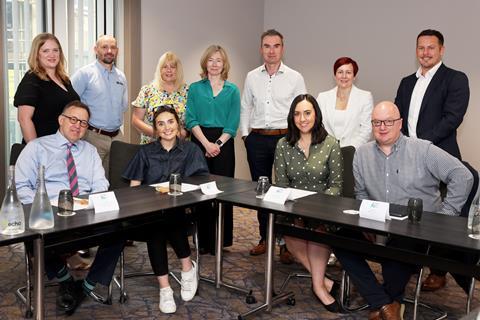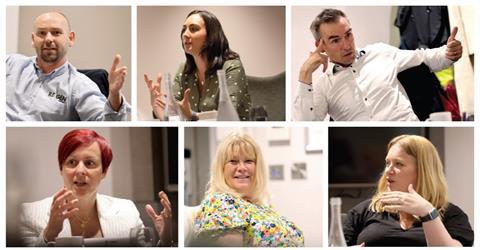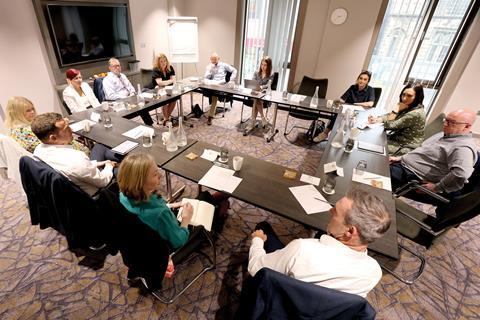The challenges and opportunities presented by the quest for net zero took centre stage as our Building the Future Commission’s regional roundtable tour headed to Newcastle


“For our region, carbon reduction is much more within reach than in many others, because the North-east is so well connected as an industry. We all know each other, supply chains are never, ever too far away and the North-east region’s labour is all very local,” said Darush Dodds, director of corporate services and social value, Esh Group. “To do a job here is quite cheap. So, I think all of that’s a massive plus for our region when it comes to working towards net zero.”
Dodds was speaking at the Building the Future Commission’s second regional roundtable, which last month took place in Newcastle and focused on the challenges and opportunities of achieving net zero in the North-east of England.
Since the start of the year the Building the Future Commission initiative has been working to discover solutions and initiatives to improve the built environment. The project does not focus on one area but instead is divided into eight workstreams focused on different aspects of the industry.

As part of the commission’s fact-finding work, and in partnership with Constructing Excellence, we are going around the country convening high-level roundtable discussions with experts in different regions to ensure that the commission hears from all corners of the UK.
The first of these saw Building gather a group of experts who each had links to the East of England for a chat about skills in a region that some see as living in London’s shadow, before the commission’s roadshow headed to Newcastle to hear from those in the North-east.
The North-east panel (listed below), chaired by Building’s editorial director Chloë McCulloch, was made up of construction leaders, all of whom have strong connections to the region and bring with them a high level of local knowledge and experience.
Attendees
- Chair: Chloë McCulloch, editorial director, Assemble Media Group
- Catriona Lingwood, chief executive, Constructing Excellence North East
- Joanne Murray, executive consultant, Gleeds
- Simon Tolson, senior partner, Fenwick Elliott
- Carol Cairns, head of project management office, Northumbrian Water Group
- Jessica Cook, net zero programme manager, North of Tyne Combined Authority
- Darush Dodds, director of corporate services and social value, Esh Group
- Lee Francis, chief executive, Re:gen Group
- Mark Gardham, regional director, Sir Robert McAlpine
- Steven Lynn, operations director, Kier Construction
- Hollie Statham, design manager, Bowmer & Kirkland
A close-knit community
The truth of Dodds’ observation about the construction industry in the North-east being a tight knit community was immediately apparent around the table, as everyone knew each other and was on first-name terms. Something the whole panel seemed to agree on was that the region’s connectedness means it is in a stronger position than others to collaborate on net zero.
Catriona Lingwood, chief executive of Constructing Excellence North East, said that where this can be particularly important is assisting smaller businesses within construction on their net zero journey. “To be frank, we need to start helping them or they aren’t going to get there,” she said. “And if the smaller and medium-sized businesses aren’t making progress, no matter what the rest of us do it isn’t going to have any real impact.”
But the panel felt this did not necessarily mean the sector was collaborating as efficiently as it could. “In general, as a region, everyone needs to be more educated; we need to have better integration of lessons learnt,” said Hollie Statham, design manager at Bowmer & Kirkland. “There are lots of brilliant projects, great ideas and approaches out there, but we aren’t as joined up as we could be to apply wider learnings. There is definitely need to improve there.”

On this point, Jessica Cook, net zero programme manager at the North of Tyne Combined Authority, said there needs to be an increased willingness to share when something hasn’t worked. “While of course it is wonderful to share best practice, it can be even more useful to hear about what hasn’t worked,” she said. “To be fair, we are seeing that happen increasingly, but accelerating that knowledge share is key.”
Joanne Murray, executive consultant at Gleeds, added that this collaboration is required in order to educate clients. “There is a distinct lack of understanding on what net zero actually is, with many clients,” she says. “They come wanting a net zero project, but when what that entails is presented, and the risks associated, they are often unprepared.”
Making sense of the numbers
“Getting the metrics right is absolutely key. You measure it, you’ll correct it and you’ll move it,” said Steven Lynn, operations director at Kier Construction. He pointed out a lack of consistency across the industry when it comes to tracking and measuring both embodied and operational data, making it hard to see how the industry is progressing. He added: “In all honesty, we can’t get anywhere if we aren’t measuring correctly – as we don’t even know where we are starting from.”
Cook agreed, saying that a cohesive approach to measurement of carbon usage must be a top priority. “We need to all baseline from the same point with the same methodology, otherwise we are comparing apples with oranges and can’t get a view of the bigger picture.”
Dodds said that many tier one or main contractors have fairly good sight of their scope one and two emissions but that scope three was significantly more tricky to track at present due to inconsistency in the supply chain.
Upcoming Building the Future Commission events
21 September: West Midlands regional roundtable (by invitation)
27 September: Building the Future Conference (open)

The day will include panel debates on net zero, digital transformation and building safety as well as talks from high-profile keynote speakers on future trends and ideas that could transform the sector.
There will also be the chance to feed in your ideas to the commission and to network with other industry professionals keen to share knowledge.
5 October: Yorkshire and the Humber roundtable (by invitation)
25 October: Wales roundtable (by invitation)
What do we do about skills?
“At a technical level the skills are just simply not there at the moment,” said Mark Gardham, regional director at Sir Robert McAlpine. “We are getting graduates or apprentices that aren’t being taught the skills they need, so what we as an industry need to do is help change that.”
Simon Tolson, senior partner at Fenwick Elliott, drew a comparison with building safety competency and the need for new and improved skill sets post Grenfell. “There is currently a sharp focus on the need for green skills, as there has been for building safety competency,” he said. ”There is a need to re-educate people who missed out on that training.There needs to be upskilling; there are new technologies, new materials and new skills, all of which are going to have to be learnt.”

Lee Francis, chief executive of Re:gen Group, which specialises in the retrofit and regeneration of social housing, concurred, saying that when it became a requirement for those working on social housing decarbonisation fund projects to have PAS 2030 certifications for energy efficiency installations, the skills shortfall was never clearer. There were certain specialities where there was no one in the region appropriately qualified to carry out work, he noted, adding that “colleges are now trying to roll out these courses [which teach retrofit skills] without industry knowledge because the government is throwing money at them” but that cannot be the path forward.
But as both Dodds and Francis pointed out, there are new retrofit specific courses (see the panel ideas summary section) on which they have been working with local colleges, designed to provide the skills the region needs most.
The solutions
As the roundtable approached its end after an hour and a half of vigorous debate, the panel were asked to come out with proposal for the Building the Future Commission on how to further net zero in their region. Responses (see below) included suggestions around encouraging and enabling innovation, how to enable change within the construction supply chain, and what is needed to ensure we are all moving in the same direction.
The key takeaways for the commission from the North-east of England roundtable were around the importance of the industry collaborating and sharing best practice, a focus on collecting and sharing the right data, and aligning aims across all parts of the sector, including training providers.
Ideas from the panel
- Upskilling the supply chain
Kier’s Steven Lynn highlighted a need for main contractors to come together to bring people within the supply up to the standards required to deliver net zero, and pointed out that the North-east is primed for this, given it is a “close-knit team” that share the supply chain. He said this approach is crucial if firms are to collate the right data and accurately track where materials have come from. - Improving carbon literacy
Jessica Cook of the North of Tyne Combined Authority pointed out the need for a general understanding of all things relating to net zero. She said it is vital that everyone is clear about what we are trying to achieve and also that net zero objectives are being measured consistently. One of the best ways this can be done, said Cook, is by sharing best practice across the sector. - Procurement changes – using a stick to create real change
Esh Group’s Darush Dodds acknowlged a need for the sector’s leaders to encourage, educate and support the supply chain, but said this can only go so far. “The only way we are going to make real progress in the end is a stick in procurement,” he argued, pointing out that 69% of Esh Group’s carbon emissions come from within the supply chain. “There is going to come a time where we are going to have to say, ‘If you want to work for us you must be achieving (a), (b) and (c) or if you aren’t we won’t be working with you any more’.” Fenwick Elliott’s Simon Tolson also said procurement reform would best enable a consistency of approach through the supply chain. - Clients driving the agenda and cultural shift
As a client, Northumbrian Water’s Carol Cairns believes that is where the agenda and cultural shift must come from. She said clients have a responsibility to “reach for the stars” when it comes to net zero as it is the only thing that will enable the rest of the industry to follow suit, and that while ambitious aims might not always be met, they are needed to drive innovation and investment in the pursuit of sustainability goals. - Integration of required industry skills with education institutions
Lee Francis of Re:gen pointed out that a big issue, particularly in the North-east, is the challenge of accessing the appropriate skills for net zero projects, particularly in residential retrofit. Both Francis and Dodds have been heavily involved in the development of five retrofit-specific qualifications across seven colleges in the region which aim to have their first intake from September. Such initiatives are vital, said Francis, as without more operatives having the appropriate skillsets, net zero projects will not be achievable. - Clarity from BRE around the approval of new products and materials to support net zero
Sir Robert McAlpine’s Mark Gardham said another issue is the barriers for SME or start-up businesses looking to develop products and materials to support net zero. A lack of clarity around cost and process for products to be certified by BRE has seen a number of innovations from smaller firms cast aside, he said, adding that the only way to overcome this is through reform at BRE aimed at creating support through the testing process.
The Building the Future Commission

The Building the Future Commission is a year-long project, launched to mark Building’s 180th anniversary, to assess potential solutions and radical new ways of thinking to improve the built environment, with thanks to our national headline sponsors Fenwick Elliott and Gleeds.
The major project’s work will be guided by a panel of 19 major figures who have signed up to help guide the commission’s work culminatuing culminate in a report published at the end of the year.
The commissioner include figures from the world of contracting, housing development, architecture, policy-making, skills, design, place-making, infrastructure, consultancy and legal.
The commissioners include Katy Dowding, executive vice president at Skanska, Richard Steer, chair of Gleeds, Lara Oyedele, president of the Chartered Institute of Housing, Mark Wild, former boss of Crossrail and chief executive of SGN and Simon Tolson, senior partner at Fenwick Elliott. See the full list here.
The project is looking at proposals for change in eight areas:
- Education and skills
- Housing and planning
- Energy and net zero
- Infrastructure
- Building safety
- Project delivery and digital
- Workplace culture and leadership
- Creating communities
>> Editor’s view: And now for something completely positive - our Building the Future Commission
>> Click here for more about the project and the commissioners
Building the Future is also undertaking a countrywide tour of roundtable discussions with experts around the regions as part of a consultation programme in partnership with the regional arms of industry body Constructing Excellence. There is also a young person’s advisory panel.
We are inviting readers to submit ideas for how to improve the built environment through our online form which will form part of our Ideas Hub coming soon.



























No comments yet